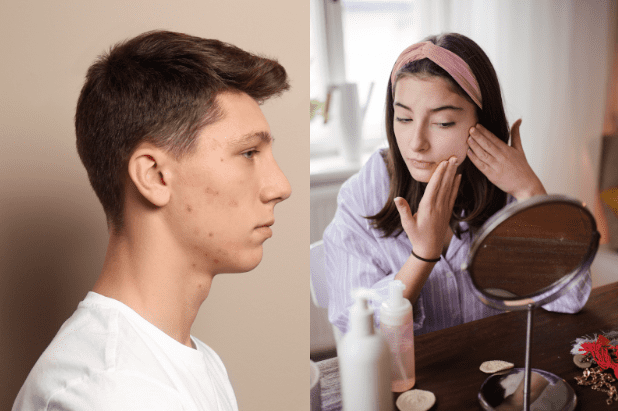
Puberty is a significant period in every young person's life. It's a period of physical and emotional changes as the body transitions from childhood to adulthood. For example, it is a period when young girls begin to develop breasts and young boys begin to look like men.
What is Puberty?
Puberty typically begins between the ages of eight and thirteen for females and nine and fifteen for boys. Your body begins to change significantly around these ages. Why? Puberty hormones such as estrogen, testosterone, and growth hormone are in high production. These substances are responsible for changing you from a child to an adult.
Understanding what to expect and how to deal with these changes might help make the experience less intimidating. This article seeks to give insights on these changes and practical advice to help early adolescents successfully handle puberty.
Physical Changes During Puberty
When your body begins to reach puberty, your pituitary gland, i.e., a pea-shaped gland located at the base of your brain, secretes specific hormones. Depending on whether you are a boy or a girl, these hormones affect different sections of your body.
Puberty brings a host of physical changes that can vary widely among individuals. Here are some common physical changes in boys and girls:
Growth Spurts
One of the most noticeable changes during puberty is a rapid increase in height and weight, known as a growth spurt. This growth spurt can sometimes cause joint aches and growing pains.
Typically, a growth spurt lasts 2 to 3 years, with some kids growing 4 or more inches per year. At the end of this spurt, you reach your adult height. It may seem like your feet are growing faster than everything else, making you feel clumsy or awkward. This is normal and is a normal part of the growth process.
Development of Secondary Sexual Characteristics
During puberty, the body fills out and changes shape. Boys' shoulders grow wider, their bodies become more muscular, and they may notice breast growth on their chest. These changes are normal and go away by the end of puberty. Boys' voices crack and become deeper; their penises grow longer and wider; and their testes grow bigger.
Erections become more frequent as the penis and testes grow in size. Ejaculation, the emission of sperm-containing semen, also occurs. Ejaculation during sleep is known as a "wet dream" or nocturnal emission.
Girls' bodies usually become curvier, their hips widen, they gain more weight and body fat, and their breasts develop. It begins with little, hard, sensitive lumps (called buds) beneath one or both nipples. The breasts will grow over the next year or two.
They may start wearing bras around this time, especially if they are involved in sports or exercise classes. The first menstrual period, or monthly cycle, usually happens about 2 years after the breasts develop. This is normal and signals that a girl is growing up and preparing for a future pregnancy.
Body Hair
Before puberty, terminal hair is restricted to the scalp, eyelashes, and brows. Following puberty, under the influence of androgens—primarily testosterone—terminal hair grows in other areas such as the underarms, legs, and pubic region, which is common for both boys and girls. For boys, dark, coarse, curling hair will grow slightly above the penis and on the scrotum. Later, hair will appear beneath the arms and in the beard region.
Girls will develop dark, coarse, curled hair on their labia. Later, additional hair will develop in the pubic area and beneath the arms.
Skin Changes
Many teenagers experience oily skin and acne due to increased hormone production. Puberty can lead to experiences like oily skin, acne, or pimples, caused by hormonal changes in the body. As you age, acne typically improves.
Emotional Changes During Puberty

Along with physical changes, puberty can be a challenging time for both parents and children, causing emotional and psychological changes:
Mood Swings
Hormonal fluctuations can lead to mood swings, making teens feel happy one moment and irritable the next. During puberty, your body is bombarded with an extensive amount of new hormones, causing a wide range of emotional changes. It might feel difficult to keep up.
Increased Sensitivity
One of the more challenging emotional transitions throughout adolescence is experiencing powerful sensations. A heightened awareness of your environment, heightened hormones, and societal demands to fit in can all heighten your emotions.
Changes in Relationship Perspective
Adolescent mental changes include changing your perspective on relationships. This might include developing stronger, more emotional ties with friends. Friends are individuals you can confide in, not merely play with, like they were when you were younger.
Self Consciousness
Adolescents may also become self-conscious about their changing bodies. This is normal. It is understood how difficult it can be for them to accept these changes while feeling the need to fit in with their friends.
Peer Pressure
As adolescents, peer groups gain more importance in their lives. This can result in peer pressure, where friends and people of the same age may try to persuade them to join in specific activities to fit in, such as dressing a certain way, speaking a certain way, or engaging in unsafe activities.
Desire for Independence
A stronger desire for independence and the need to establish a personal identity often lead to conflicts with parents and authority figures.
Coping With Puberty Changes
As children mature, they may have concerns about their physical changes during puberty. To handle the changes of puberty, they require support, reassurance, and facts. Here are some tips to help manage the physical and emotional changes during puberty:
Managing mood swings
Managing all of these new emotions might be difficult at times. It's crucial to understand that your mind is adjusting to the new hormones just as much as your body. Most individuals are not intentionally aiming to harm or disturb you.
Having mood swings is an excellent opportunity to practice expressing your thoughts and emotional needs. Instead of lashing out, express your feelings. Consider keeping a mood journal.
Keeping a mood journal can help track emotions and identify patterns or triggers. Consider the Mood Journal designed for teens, which offers prompts and tips for better emotional health. It’s available for $90.
Dealing with Acne
Proper skin care is essential. Washing the face twice a day with a gentle cleanser and avoiding oily makeup or skincare products can help. For persistent acne, consider an acne treatment kit. This Acne Treatment Kit has been highly rated for its effectiveness in reducing acne and improving skin health. It's available for $85.
Handling Body Odor
As sweat glands become more active, body odor can become a concern. Regular bathing and using deodorant or antiperspirant can help manage these issues. It's important to choose products that are suitable for sensitive skin.
Understanding Body Changes
Reading informative books can provide a better understanding of the changes happening in the body. The Puberty Education Book offers comprehensive insights and tips for teens navigating this stage. This book is available for $95.
Open Communication
Encouraging open communication with parents, guardians, or trusted adults can provide emotional support and guidance. It's essential for teens to know they are not alone and that their experiences are normal.
Encouraging Healthy Habits
During puberty, it's essential to focus on self-care and develop healthy habits to help you thrive. Some of which include:
- Balanced Diet: Eating a balanced diet rich in fruits, vegetables, proteins, and whole grains supports overall health and can help manage skin issues.
- Regular Exercise: Physical activity helps in maintaining a healthy weight, reducing stress, and improving mood. Regular exercise releases feel-good hormones, balancing mood and easing anxieties.
- Adequate Sleep: Teens need more sleep as their bodies grow and change. Establishing a regular sleep routine can aid in overall well-being. Getting 8-10 hours of sleep is crucial for a healthy body and mind.
- Good hygiene practices like daily showering, wearing deodorant, and brushing your teeth keep you feeling fresh.
- Find trusted sources of information about puberty and ask questions. Talk to a parent, teacher, or doctor if you have concerns.
- Connect with supportive family and friends who understand your struggles and join sports teams or clubs to stay socialized and build new friendships.
- Practice self-care: Self-care during puberty involves engaging in enjoyable activities such as hobbies, art, music, and journaling to relieve stress and boost confidence.
These tips will help you handle the transition and maintain a healthy lifestyle during puberty. It's important to be patient with yourself and embrace the changes that come with puberty. With time and practice, coping with puberty will become second nature.
Conclusion
Puberty is a challenging but natural part of growing up. By understanding what to expect and how to cope with the changes, teens can handle this period with greater confidence and ease. Everyone goes through puberty differently, and it's important to be patient and kind to oneself during this time.
For parents and guardians, being supportive, providing accurate information, and maintaining open lines of communication are key to helping teens manage the changes they experience during puberty.
By following these tips and understanding the changes that come with puberty, teens can feel more prepared and less anxious about this critical stage of development.